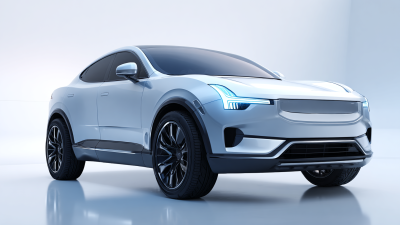Leave Your Message
As the global push towards sustainable transportation intensifies, businesses are increasingly looking to electric cars to reduce their carbon footprint while also optimizing operational efficiency. According to a report by the International Energy Agency (IEA), electric car sales surged by 41% in 2020, marking the highest annual increase in history, and the global electric vehicle (EV) stock reached 10 million. This shift is not only environmentally motivated; it aligns with economic benefits such as lower fuel costs and maintenance savings. Choosing the best electric car for your business needs requires careful consideration of various factors, including battery range, total cost of ownership, and charging infrastructure. With projections from the BloombergNEF estimating that electric cars could make up over 50% of new car sales by 2040, now is the ideal time for businesses to embrace this transformative technology.

When selecting electric cars for your business needs, it’s essential to consider several key factors that can significantly impact your operations and overall efficiency. First, assess your driving patterns and charging infrastructure. Will your business involve long-distance travel, or will most trips be within the city? Understanding your charging capabilities is crucial; ensure that your location has sufficient charging stations or consider investing in on-site charging solutions for maximum convenience.

Another critical consideration is the total cost of ownership. While the initial price of electric vehicles may be higher, they typically boast lower maintenance costs and fuel savings in the long run. Additionally, explore the tax incentives available in your region, as these can significantly reduce your upfront expenses.
Tips:
- Evaluate the pros and cons of used electric vehicles, as they often present a lower-cost entry point with the added benefits of reduced charging costs.
- Keep abreast of the latest technological advancements and charging solutions, as these can vary widely and affect your decision-making. Selecting a model with a reliable range that mitigates charging anxiety can also be beneficial for business efficiency.
When choosing an electric car for global business operations, evaluating range and battery life is paramount. According to the International Energy Agency (IEA), the average range of electric vehicles (EVs) has increased significantly, with many models exceeding 250 miles per charge in 2023. This improvement allows businesses to plan more efficient routes and reduces downtime for recharging. However, it’s crucial to assess the specific needs of your operations, especially if you're conducting activities across diverse geographies with varying infrastructure for EV charging.
Tip: Consider the charging infrastructure in your target markets. Areas with extensive fast charging stations can accommodate vehicles with shorter ranges, while regions with limited access may require models with longer ranges to minimize disruptions. Moreover, battery life is also a key factor; the lifespan of most EV batteries is around 8-15 years, as reported by the US Department of Energy, ensuring you factor in not just the initial performance but also long-term reliability.
Similarly, businesses should look into the total cost of ownership, which includes not just purchase price but also maintenance and energy costs. A study by Bloomberg New Energy Finance highlights that the total cost of owning an electric vehicle can be lower than that of traditional gasoline vehicles over time, especially as battery technology continues to advance.
Tip: Analyze your fleet's usage patterns and calculate projected energy costs based on local electricity prices. Exploring fleet management software can provide insights into optimizing the usage of electric vehicles and help in making informed decisions regarding range and battery life.

When selecting the best electric car for your business, understanding the charging infrastructure and its accessibility across different regions is crucial. In North America, the DC charger market is segmented by power output, with stations offering up to 150 kW and those above this threshold. The utilization of these charging stations is significantly influenced by their accessibility. For instance, the driving distance to major city areas directly impacts how often these stations are used. A well-established network of charging stations in urban centers enhances operational efficiency for electric vehicle (EV) fleets.
In India, the electric vehicle charging station market was valued at approximately 2.34 billion USD in 2023, highlighting the rapid growth and investment in charging infrastructure. This growth is essential for supporting a rising number of electric vehicles on the road. As businesses expand their electric fleets, they must consider locations where charging stations are easily accessible to ensure minimal downtime. The emergence of innovative technologies, such as Vehicle-to-Everything (V2X) systems, further enhances the management of energy and charging, making it vital for companies to stay informed about developments in this sector.
When considering an electric vehicle (EV) for your business, understanding the total cost of ownership (TCO) is crucial. According to a recent report by BloombergNEF, the lifetime cost of ownership for electric cars is now often lower than that of conventional internal combustion engine vehicles. This is particularly true when factoring in purchase price, maintenance, and available incentives. The average TCO for EVs can be up to 30% lower than traditional vehicles, thanks to reduced fuel costs and fewer moving parts that require maintenance.
Tip: Always research local incentives for electric vehicle purchases, as governments frequently offer tax credits, rebates, and grants that can significantly reduce initial costs. For instance, in the United States, the federal tax credit for EV purchases can be as high as $7,500, depending on the model.
Additionally, maintenance costs can play a significant role in the TCO equation. A study by the Automotive Leasing Guide revealed that electric vehicles generally incur 50-70% lower maintenance costs compared to gasoline vehicles over their lifetime. With fewer components that are subject to wear and tear, such as oil changes and exhaust systems, businesses can save significantly on maintenance.
Tip: Set up a comprehensive tracking system to monitor not only the initial purchase costs but also ongoing operational expenses. This will provide valuable insights into your overall investment and help in projecting future costs accurately.
As businesses increasingly prioritize sustainability, the choice of an electric vehicle (EV) becomes a vital component of corporate strategy. Understanding how EVs can bolster a company's sustainability goals is essential. By integrating electric cars into their fleets, businesses not only reduce greenhouse gas emissions but also demonstrate a commitment to environmental stewardship. This is particularly significant in a world where consumers are placing more emphasis on eco-friendly practices when making purchasing decisions. Adopting EVs aligns a company's operations with broader sustainability efforts and can enhance its reputation among environmentally conscious stakeholders.
Moreover, the impact of electric vehicles on brand image cannot be overstated. Brands that embrace EV technology often find that their image improves, attracting a newer, more eco-aware demographic. This shift is not just about compliance with regulatory standards; it illustrates a proactive stance towards contributing to a sustainable future. Companies that communicate their use of electric vehicles effectively can harness this narrative to differentiate themselves in a competitive marketplace. As regulations tighten globally and consumer expectations evolve, companies that prioritize EVs stand to gain a significant advantage in both brand loyalty and market positioning.






